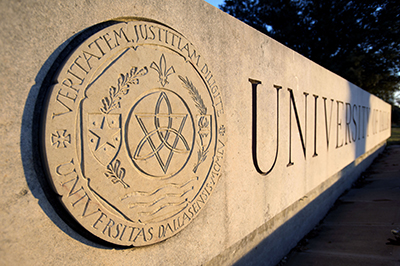 Menu
Menu

The Core, historical and ahistorical, looping again and again through the great questions
with thanks to Dr. Andrew Moran, who taught me this about the Core
At some schools that have a core curriculum, students take on the subjects in historical succession. They start with the Greeks, and study the Greeks’ philosophy, literature, and art all together in one semester. Then they move on to the Romans and do the same thing … then the Medieval world, and then the Renaissance, and so forth, all the way to contemporary times.
This method has some validity, but it also has some weaknesses. UD takes a different path in its Core Curriculum.
Second, since such a chronological curriculum ends in the present, the historical march tends to say to students, implicitly, that we are the goal of all this: we in the modern world are the apex of this progress through the years; we are the destination at which all this arrives, as if we are better than any age that has passed before us. That’s not true, and it can lead to hubris — pride. C.S. Lewis calls this “chronological snobbery” — the notion that, just because we are more technologically advanced, we think we know more about the human heart than Dante, Chaucer, Shakespeare, or Jane Austen. As Lewis notes, we might not know any more than they, and in fact, might know less: We may have forgotten some of the truths that these earlier thinkers and ages knew.
Instead, at UD, students study this historical progression, but they do it in two different ways: first, by reading in each different discipline, and second, by looping back and forth through the ages.
By reading in each discipline, UD students find, in contrast to other schools, that we take much more time on each text. Students spend five weeks on the Iliad, another five on the Odyssey. They spend as many as 10 weeks swimming in Plato’s Republic! Students get to absorb deeply these thinkers and poets from passionate teacher-scholars in these fields.
Second, while there is some historical progression — Iliad to Odyssey to Aeneid to Dante to Milton, for instance, in Literary Tradition I and II — in the next class, Literary Tradition III, students go back to the Greeks and end up in the Early Modern period, focusing not on the historical development of drama but on tragedy and comedy as genres, types of literature that offer different ways of knowing and potentially different answers to human questions. Students might start again with the Greeks in their Politics class, and in Western Civilization or Understanding the Bible or Economics or Western Theological Tradition find themselves constantly looping back to these same questions, these same problems, over and over again through the ages: What does it mean to be human? What is the nature of the divine? How can people live together well, rather than badly? Students don’t just get “the Greek” answer to this question, move on to “the Roman” one, and then throw that aside for a better, more “advanced,” more “progressive” one: No, they are constantly challenged to renew these questions and see them from different perspectives, and measure all of these against the fullness of Truth as revealed by God. And they are saved from the hubris of thinking we moderns are the ones who, because we happen to be later in time, have arrived at the “right” answers.
It is this astonishing combination of historical perspective and ahistorical philosophical, poetic, and theological perspective that is the mark of the UD Core, and one of its great strengths in creating independent thinkers steeped in the Catholic intellectual tradition of faith and reason.